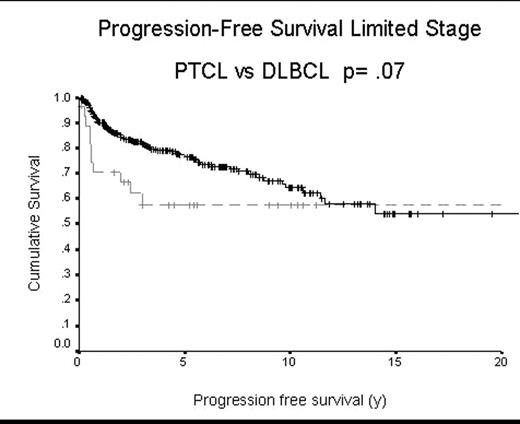Abstract
Background: Peripheral T-cell lymphomas (PTCL) represent a heterogeneous group of diseases with an overall poor prognosis. Little information is available regarding the outcome of PTCL patients who present with limited stage disease. We sought to determine the outcome of PTCL patients presenting with limited disease in comparison with a cohort of patients with limited stage diffuse large B-cell lymphoma (DLBCL).
Methods: In a retrospective analysis we identified all patients with limited stage (non-bulky (<10cm) stage I/II disease no symptoms) PTCL diagnosed at the British Columbia Cancer Agency (BCCA) between 1983 and 2004. Patients were excluded if they had cutaneous anaplastic large cell lymphoma (CutALCL) (n=13), NK/T-cell lymphoma nasal type (n=9) or primary CNS/ocular involvement (n=6).
Results: Thirty-seven patients with PTCL were identified according to the World Health Organization Classification: ALK-neg ALCL 8 (22%); PTCL-unspecified (PTCLUS) 28 (78%); enteropathy associated TCL (EATL) 1 (3 %). The majority received CHOP-type chemotherapy (n=31, 86%), most with brief chemotherapy followed by involved-field radiation (n=19, 61%). The 5 y OS and PFS was similar between PTCLUS and ALK-neg ALCL. There was no difference in survival between extranodal and nodal cases. The outcome of PTCL patients (including ALK-neg ALCL and PTCLUS) was compared to a cohort of limited stage DLBCL patients (excluding CNS/ocular lymphoma) (n=305) diagnosed over the same time period and treated similarly. There was no difference in 5 y OS or PFS (Figure 1,2). Interestingly, there were no late relapses observed in PTCLUS, in marked contrast to DLBCL.
Conclusions: Limited stage PTCL is rare, however outcomes appear to be comparable to early stage DLBCL, supporting that they should be treated in a similar manner. Unlike limited stage DLBCL where late relapses occur, a plateau in the progression-free survival curve is observed, highlighting a distinct natural history for limited stage PTCL.
Overall Survival Limited Stage PTCL vs DLBCL p=.18
Progression-Free Survival Limited Stage PTCL vs DLBCL p=.07
Author notes
Corresponding author



